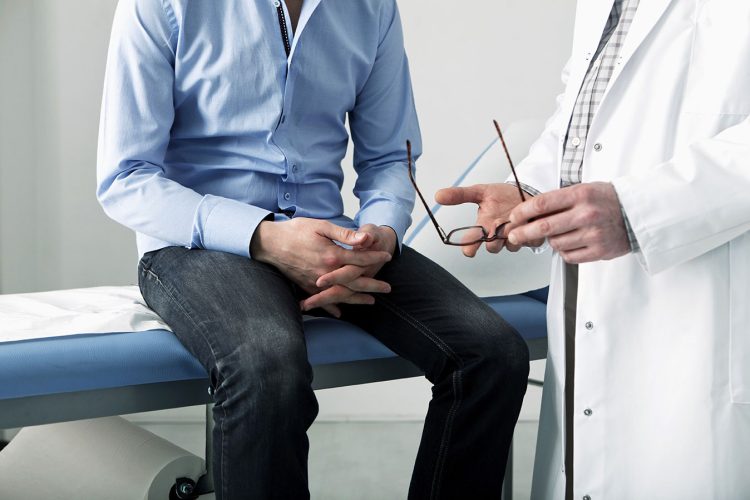Dans le premier article nous avions décrit la taille de la prostate en fonction de l’âge, tout en énumérant quelques symptômes, mais surtout, les facteurs aggravant les risques de problèmes de la prostate et les facteurs les réduisant.
Beaucoup d’hommes ne savent pas que l’inflammation de la prostate peut causer des symptômes dès l’âge de 50 ans. De plus, l’inflammation de la prostate augmente les risques de développer un cancer. Nous devrions même considérer l’inflammation de la prostate comme la première étape vers le développement d’un cancer de la prostate. Il s’agit du cancer le plus diagnostiqué au monde pour les hommes; environ 15 à 20% des hommes seront atteints au cours de leur vie. Heureusement, les taux de mortalité reliés au cancer de la prostate sont en diminution depuis 2001. Environ 3,5 % des hommes en mourront.
Il est important de reconnaître les symptômes pouvant provenir d’une inflammation de la prostate. C’est ce que l’on appelle habituellement l’hyperplasie prostatique bénigne (HPB) ou hypertrophie de la prostate. L’élargissement de la prostate est fréquente à partir de 40 ans. Elle cause une obstruction du flux d’urine dans l’urètre, ce qui rend difficile de vider complètement la vessie. Cela entraînant des mictions plus fréquentes, un jet plus faible et, même parfois, une incontinence.
Voici donc les principaux symptômes :
- Douleurs ou mictions intermittentes
- Besoins fréquents d’uriner (mictions fréquentes)
- Besoin pressant ou soudain d’uriner (mictions urgentes)
- Problème sexuels (ex : douleur à l’éjaculation ou problème érectile)
- Lourdeur au niveau du rectum (sensation d’avoir besoin d’aller à la selle)
Si vous avez des doutes, il est bien sûr important de consulter rapidement votre médecin qui vous réfèrera au besoin à un urologue. Ces symptômes sont similaires aux symptômes causés par un cancer de la prostate.
Voici les principaux symptômes du cancer de la prostate :
- Besoin d’uriner souvent (mictions fréquentes), surtout la nuit
- Besoin pressant ou soudain d’uriner (mictions urgentes)
- Difficulté à commencer à uriner et effort pendant la miction
- Jet d’urine faible ou lent, ou qui s’interrompt
- Incapacité de vider complètement la vessie
- Difficulté à contrôler sa vessie (incontinence), ce qui peut entraîner des fuites urinaires
- Présence de sang dans l’urine
- Sensation de brûlure ou douleur pendant la miction
- Présence de sang dans le sperme
- Éjaculation douloureuse
- Difficulté à avoir une érection (dysfonctionnement érectile)
- Douleur ou raideur dans les os des hanches, du dos ou de la poitrine
- Faiblesse ou engourdissement dans les jambes ou les pieds
- Perte du contrôle des intestins
- Toux qui ne disparaît pas ou essoufflement
Pour plusieurs, ils sont identiques, d’où la grande importance de consulter son médecin. La majorité des cancers de la prostate se développeront très lentement et selon l’âge de la personne, beaucoup ne demanderont aucun traitement. Un suivi périodique est requis pour s’assurer qu’il n’y a de développement rapide. Les facteurs réduisant ou aggravant les risques de problèmes de la prostate présentés au premier article sont les mêmes facteurs qui réduisent ou augmentent les risques d’un développement rapide du cancer de la prostate en cas de diagnostic.
En terminant, VitoliMD Prostate peut être utilisé en traitement ou en prévention. Il peut être pris en concomitance de la médication habituelle (N.B. il est toujours conseillé d’en parler à son pharmacien). Voici les allégations santé permise par Santé Canada pour VitoliMD Prostate :
- Aide à maintenir la prostate en santé.
- Utilisé en phytothérapie pour aider à soulager les symptômes urologiques associés à l’hypertrophie bénigne de la prostate, légère à modérée.
- Fournit des antioxydants.
Références
Site internet de la Fondation québécoise du cancer : www.fqc.qc.ca
Site internet de la Société canadienne du cancer : www.cancer.ca
Fujita K, Hayashi T, Matsushita M, Uemura M, Nonomura N. 2019. Obesity, Inflammation, and Prostate Cancer. J Clin Med. 2019 Feb 6;8(2). Review.
Hackshaw-McGeagh LE, Perry RE, Leach VA, Qandil S, Jeffreys M, Martin RM, Lane JA. 2015. A systematic review of dietary, nutritional, and physical activity interventions for the prevention of prostate cancer progression and mortality. Cancer Causes Control. 2015 Nov;26(11):1521-50. Review.






